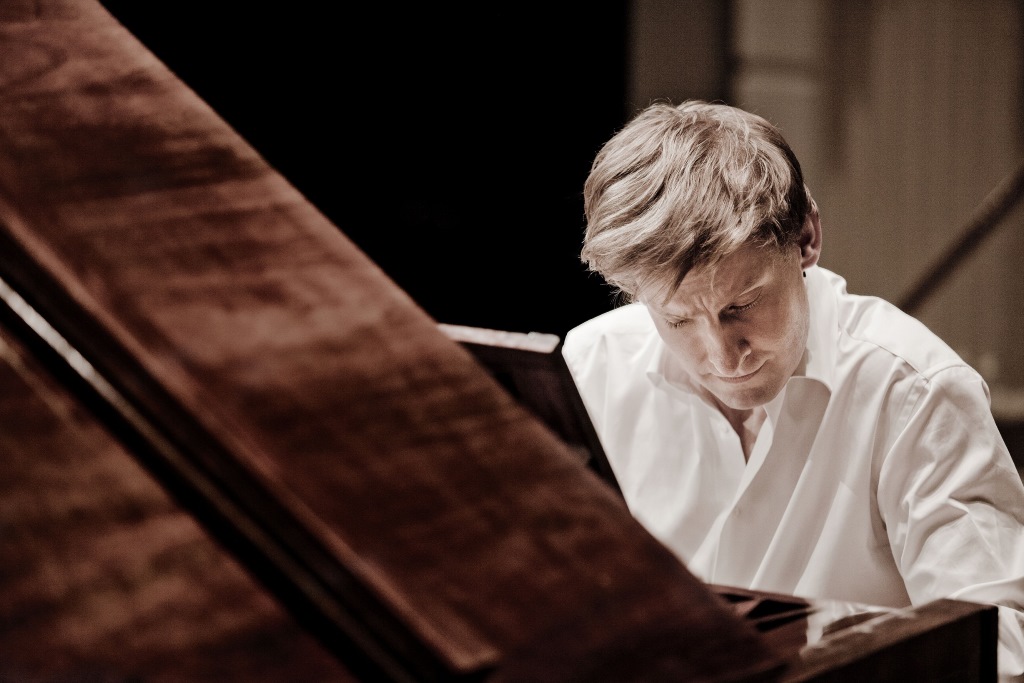Master of the Fortepiano
Internationally known performer Kristian Bezuidenhout may change your view of Mozart.
Early Music Now explores “The World of the Fortepiano” this Saturday evening at Wisconsin Lutheran College. The group’s concerts usually feature an ensemble devoted to researching and reconstructing an esoteric moment nearly lost to Western music history. I have found these historical recreations to be satisfying and enlightening.
But this Saturday, the material will be familiar, but an instrument will be the focus. Or rather, Kristian Bezuidenhout, an internationally renowned interpreter of the fortepiano, will provide evidence that we have not heard the keyboard works of Wolfgang Amadeus Mozart as he would have prepared them.
A fortepiano strikes the strings with a hammer, unlike the plucking action of an harpsichord. Developed in the early 1700’s, the fortepiano evolved through a number of incremental inventions until advanced designs culminated in the grand piano in the early 1800’s. Mozart, George Frideric Handel and early Ludwig van Beethoven works were composed on a fortepiano.
Harpsichords produced a clear, distinctive sound, but could not alter the dynamics of the sound. The fortepiano (Italian for “loud-soft”) added that dimension. Critics observe that the fortepiano creates a slight buzzing in the bass and a “tinkling” in the high treble. Bezuidenhout argues that for him, “there’s no better vehicle than the fortepiano for exploring the crisp articulations, keenly articulated characters, and pointillistic levels of detail that can get lost inside a modern piano’s heft and plushness.”

Fortepiano by Johann Andreas Stein (Augsburg, 1775). Photo by Gerard Janot.
A London Times critic observed that “Bezuidenhout is a prince of the fortepiano, making it sing in melodic phrases as no other practitioner of this intractable instrument has done in my experience.” And Patrick Rucker wrote for Fanfare Magazine, “Bezuidenhout’s approach to Mozart is so captivating, his playing so natural, it’s tempting to forget that only artistic temperaments of the fiercest integrity are capable of such exalted music-making. ” A native of South Africa, currently resident in London, Bezuidenhout will be making a rare appearance in Milwaukee.
The concert features a mature work by Mozart, his Piano Sonata No. 13 in B-flat Major, K.333. The sonata features a lovely cantabile, a beautifully worked rondo and a closing cadenza. (Virtuoso elements such as a cadenza are usually reserved for a keyboard concerto.)
Bezuidenhout will play a complete suite which Mozart organized in the style of baroque suites – his Suite in C Major, K.399. Few were still aware of J.S. Bach‘s work at this time, but Mozart joined a few enthusiastic supporters to study his works. Mozart’s suite appears to have been an exercise exploring Bach’s style. Mozart did not finish a last movement, the Sarabande, which has been completed recently by Robert D. Levin.
The concert includes two short works by Mozart: a Minuet in D Major, K.355/576b and his Gigue in C Major, K.574. They may be familiar in a different form. Tchaikovsky orchestrated them as the first two movements of his Orchestral Suite No. 4, subtitled “Mozartiana.”
Bezuidenhout will also play two works by Carl Philipp Emanuel Bach: Rondo in C Minor, Wq.59/4 and Sonata in E Minor, Wq.59/1.
CPE Bach, one of J.S. Bach’s many sons, was an older contemporary of Mozart’s. (He died, age 74, three years before Mozart’s death in 1791 at 35.) His works are considered more classical than baroque – even incorporating a pre-romantic dramatic fluidity that “intended to express true and natural feelings and changes of mood.”
CPE. Bach composed nearly 200 hundred keyboard sonatas, as well as a number of shorter works for keyboard. He authored a definitive treatise on the subject – “An Essay on the True Art of Playing Keyboard Instruments.”
The concert will be held November 21 at 7:30 P.M. at the Center for Arts and Performance (8815 W Wisconsin Ave) at Wisconsin Lutheran College. A pre-talk by Bezuidenhout will precede the concert at 6:30 P.M. Tickets may be purchased online or by calling (414) 225-3113. Available tickets range from $29/$46 adults and $10/$15 students. (In this Wisconsin Lutheran College venue, even the “cheap” seats will sound great.) Complete program notes are available online as well.
The next Early Music Now concert will be held at the Basilica of St. Josephat at 7:30 P.M. December 19. Anonymous 4, women’s a Capella quartet, will present an anthology of their most-loved songs of Christmas and “other ancient prophecies and miraculous events.” On a farewell tour, this will be their sixth appearance with Early Music Now.
Preview
-
A Sacred Choir, 70 Voices Strong
 Dec 14th, 2025 by Martha Brown
Dec 14th, 2025 by Martha Brown
-
Prometheus Trio Goes Bohemian
 Dec 3rd, 2025 by Martha Brown
Dec 3rd, 2025 by Martha Brown
-
Present Music Offers New Choral Works
 Nov 20th, 2025 by Michael Barndt
Nov 20th, 2025 by Michael Barndt

















